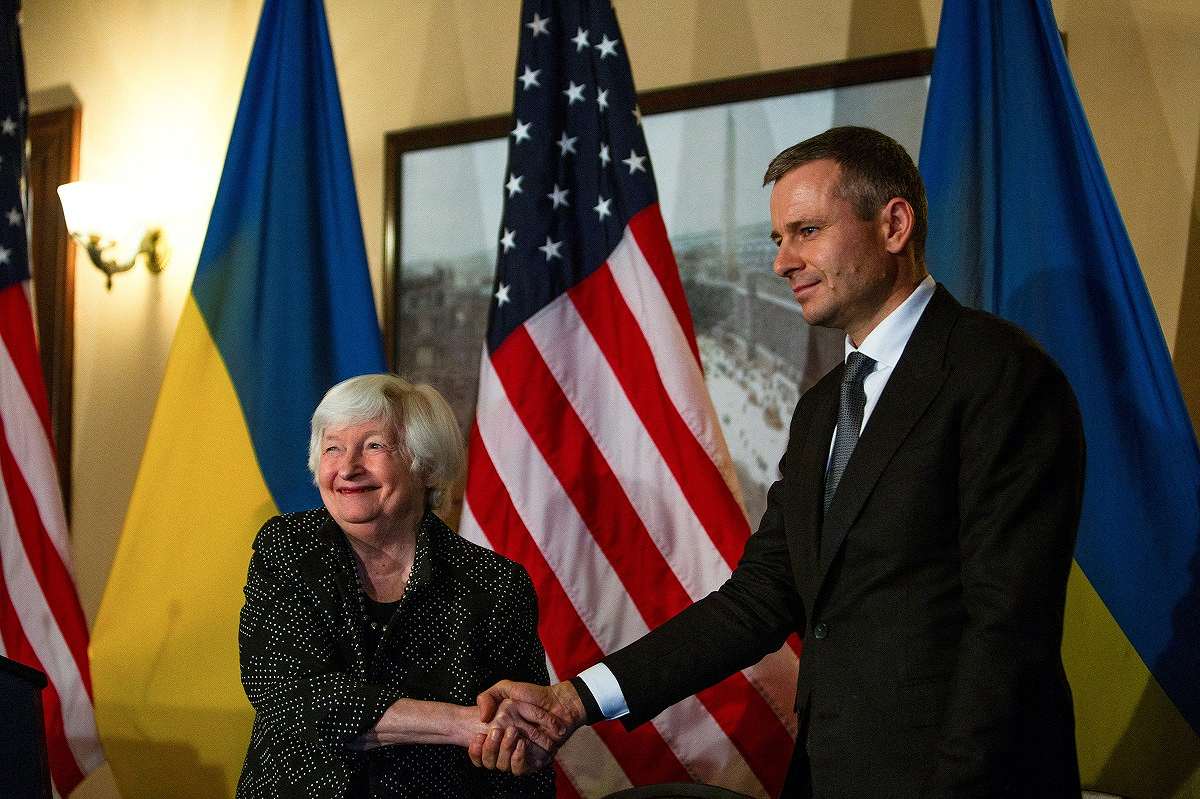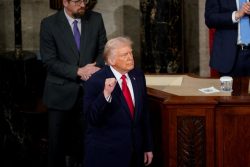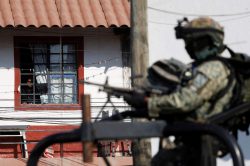
U.S. Treasury Secretary Janet Yellen holds a bilateral meeting with Ukraine Finance Minister Sergii Marchenko on the sidelines of the IMF and WB annual meetings, at the Treasury Department in Washington, U.S., October 23, 2024.
16:21 JST, October 26, 2024
ROME/WASHINGTON (Reuters) – Leaders of the Group of Seven wealthy democracies on Friday reached consensus on delivery of some $50 billion in loans to Ukraine backed by the earnings from frozen Russian sovereign assets starting as early as December.
“These loans will be serviced and repaid by future flows of extraordinary revenues stemming from the immobilization of Russian Sovereign Assets,” the G7 statement said.
“Our aim is to begin disbursing the funds by the end of the year,” said the statement, which was released as global finance chiefs were meeting in Washington for the International Monetary Fund and World Bank annual meetings.
An accompanying statement from G7 finance ministers said that the loans would be disbursed through a series of bilateral loans, starting as soon as Dec. 1 and continuing through the end of 2027 “in installments that will reflect Ukraine’s urgent financing needs.”
Each bilateral loan would enter into force no later than June 30, 2025, which provides some timing flexibility for G7 members to arrange details.
The statement announcing the principles and some technical details did not provide specific amounts for the bilateral loans but said additional details will be issued in a term sheet to be distributed in coming days.
ELECTION TIMING
The U.S. on Wednesday announced it would give Ukraine a $20 billion loan during December, timing meant to shield the loan funds from a potential claw-back should Republican presidential candidate Donald Trump win the November U.S. election.
Trump has vowed to “get out” of Ukraine’s war with Russia. The next U.S. president would not take office until January.
Another $20 billion loan is expected to come from the EU, home to G7 members Germany, France and Italy, with the remaining $10 billion split between Canada, Britain and Japan.
“We will stand by Ukraine for as long as it takes,” the finance ministers’ statement said.
The loans will be disbursed through multiple channels, including a Macro-Financial Assistance Loan from the EU, the IMF’s Multi-Donor Administered Account for Ukraine and a newly created Financial Intermediary Fund for Ukraine at the World Bank, the statement said.
G7 PLEDGE
Friday’s announcement of the “extraordinary revenue acceleration loans” makes good on an easement reached in June by G7 leaders during their annual summit in southern Italy to harness earnings from frozen Russian assets to aid Ukraine, a deal that left many technical details to be hammered out.
Some 260 billion euros ($280.62 billion) in Russian assets such as central bank reserves were frozen under sanctions imposed following Moscow’s invasion of Ukraine in February 2022.
The vast majority of those assets are held in Euroclear, a Belgium-based central securities depository, making the European Union a key player in any plan to make use of the assets.
“The G7 remains steadfast in its solidarity to support Ukraine’s fight for freedom, and its recovery and reconstruction,” the G7 leaders’ statement said, adding that “time is not on (Russian) President Putin’s side.”
($1 = 0.9265 euros)
Top Articles in News Services
-

Survey Shows False Election Info Perceived as True
-

Hong Kong Ex-Publisher Jimmy Lai’s Sentence Raises International Outcry as China Defends It
-

Japan’s Nikkei Stock Average Touches 58,000 as Yen, Jgbs Rally on Election Fallout (UPDATE 1)
-

Japan’s Nikkei Stock Average Falls as US-Iran Tensions Unsettle Investors (UPDATE 1)
-

Trump Names Former Federal Reserve Governor Warsh as the Next Fed Chair, Replacing Powell
JN ACCESS RANKING
-

Producer Behind Pop Group XG Arrested for Cocaine Possession
-

Japan PM Takaichi’s Cabinet Resigns en Masse
-

Man Infected with Measles Reportedly Dined at Restaurant in Tokyo Station
-

Israeli Ambassador to Japan Speaks about Japan’s Role in the Reconstruction of Gaza
-

Videos Plagiarized, Reposted with False Subtitles Claiming ‘Ryukyu Belongs to China’; Anti-China False Information Also Posted in Japan
























